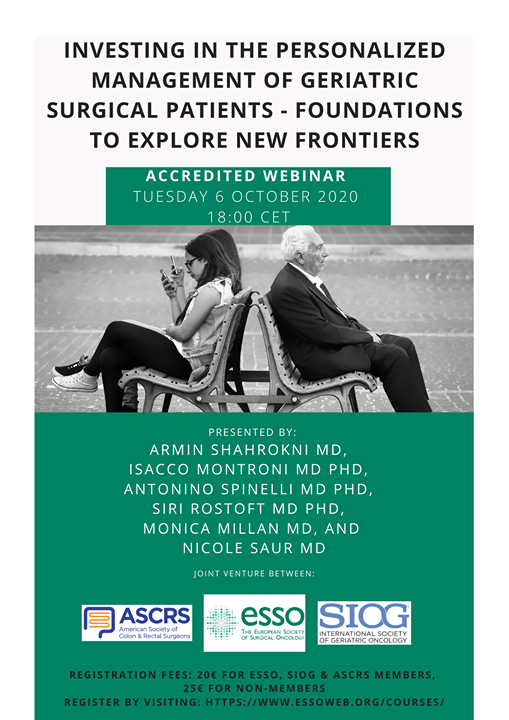
Investing In The Personalized Management of Geriatric Surgical Patients — Foundations to Explore New Frontiers
This interactive joint venture webinar with the International Society of Geriatric Oncology (SIOG) will be presented by Armin Shahrokni MD, Isacco Montroni MD PhD, Antonino Spinelli MD PhD, Siri Rostoft MD PhD, Monica Millan MD, and Nicole Saur MD on Tuesday 6th October 2020 18:00 CET.
Despite growing evidence and discussion about frailty as a determinant of outcomes in older adults, chronological age is often still used to justify under or over treatment of these patients. Complicating factors such as predisposition for complications or delirium are not identified by a standard pre-operative interview. Therefore, clinicians must screen for frailty and identify patients who are at risk for these events in the perioperative period. In addition, pre-operative optimization of functional status and comorbidities is essential to achieve post-operative functional recovery.
When looking at treatment options, the standard of care does not always translate into the best tailored treatment when treating geriatric patients. Personalized care is essential to treat the patient based on their disease state, fitness, and individual treatment goals. A multidisciplinary approach is needed to prioritize the patients’ needs and wishes, rather than conform to the physicians’ skills.
We will highlight how surgeons can use past studies and experiences to build a multidisciplinary team to take care of geriatric patients in their everyday practices. From all angles, it is clear that older adult patients are unique, and their cancer surgery care should be individualized and approached in a multidisciplinary fashion.
Main topics
Evaluation of patient fitness to undergo surgery should be undertaken in the elective and emergent settings. Patients should be optimized prior to treatment whenever possible and their treatment should be tailored based on their disease state, fitness, and individual treatment goals. However, this is often not undertaken in busy clinical practices and this represents an opportunity to present multidisciplinary experts to facilitate discussion of information gained from recent studies. This information can be utilized in everyday colorectal surgery practices to provide optimal care of geriatric patients and improve outcomes
Expected Educational Outcomes
• Identify the most useful frailty screening tools at a surgeon’s disposal
• Identify the key metrics of functional recovery/QoL and know how to measure them in the post-operative patient population
• Identify signs of delirium and methods to prevent and treat delirium.
• Describe how to identify the key metrics that matter most to geriatric patients
Participant profile
• Surgical residents in the last two years of specialisation
• Junior Surgical oncologists and colorectal surgeon within 5 years of ending specialisation residency
• Senior Surgical oncologists and colorectal surgeon
• Geriatricians
• Medical Oncologists




